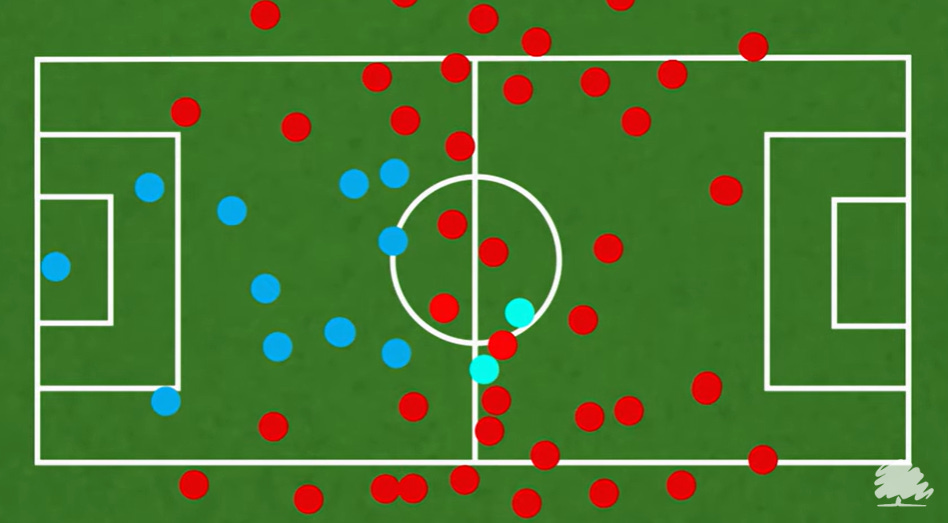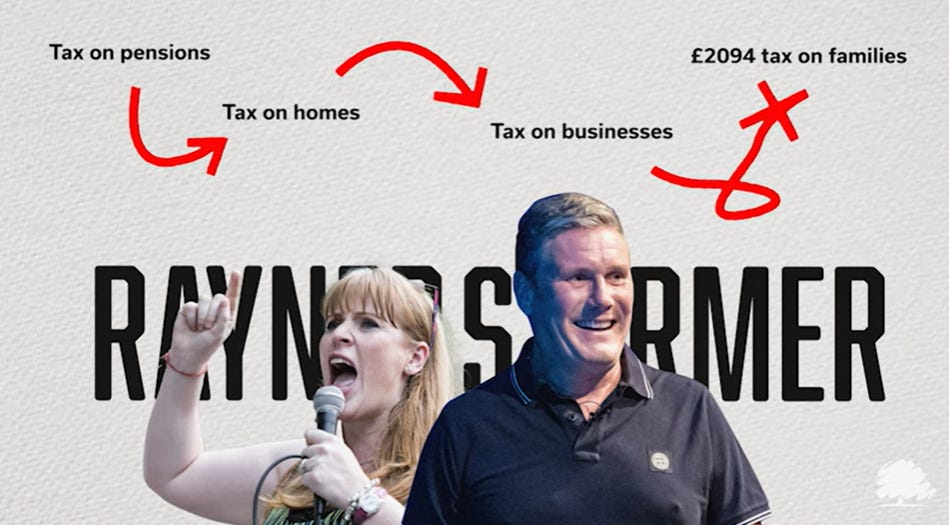Into injury time
If Labour are going to be so terrible, how come they're never going to lose an election again?
A couple of weeks ago Christopher Hope of GB News used an absolutely amazing football analogy in a question to Conservative Chief Secretary to the Treasury Laura Trott:
“The Euros start this weekend. If the Tories are a football team, you’re 4-0 down and the crowd is booing you. Isn’t it time to do a deal with a striker on a rival team and get Nigel Farage to do a deal with the Tory party and see off Labour?”
The political meaning of this analogy is straightforward but it is not entirely clear what, in footballing terms, Hope was suggesting here: possibly a mid-game transfer, possibly bribing an opposing player. Nigel Farage’s team isn’t the one the Tories are 4-0 down to, so perhaps he’s supposed to be coming in mid-game from another team entirely. But in any case, there is no possible interpretation of Hope’s question that isn’t completely against the rules, and several possible interpretations that are just unarguably corrupt: as threatening to the integrity of the game as, say, players betting on matches in which they are participating. Imagine if politicians did that!
The European Championships make football analogies topical,1 and that makes them more tempting for journalists and politicians and parties to build talking points around, which means there have been lots. As a result, there have been even worse ones than this, and the Conservative Party has built a whole election broadcast around them. Here it is.
Here’s the key line:
“Polls are showing that we are headed for a Labour supermajority that will change the direction of this country in a way many simply haven’t bargained for. Parliament would become the political equivalent of Barcelona going up against a Sunday league side.”
The broadcast even includes a visual representation of this confusing metaphor:
The red Labour team has more than twice as many players as the blue Tory team, plus a host of additional players waiting to come on, although the red team hasn’t bothered to field a goalkeeper for some reason, and there are also two light blue Reform players whose role in the game is wholly unclear (in earlier frames there are also a small number of yellow Lib Dem players who turn red).
Now, there’s a reason Barcelona against a Sunday league side would be an unfair contest, and it isn’t that they have more players on the field. They don’t have more players on the field. The issue is that Barcelona are much, much, much better. They are quite literally in a different league. You should want your government to be more like Barcelona than a Sunday league team. The Sunday league team may well be a nice bunch of lads, but the thing about football is that it is fundamentally a test of how good you are at football. The Conservatives have used a number of surprising lines in this campaign but none, surely, as surprising as “We’re shit, and we know we are”.
However, at the same time as saying that Labour are like Barcelona, and that they have too many players, the Conservatives also want to use another, incompatible football metaphor: “Labour are the most left-wing side on the pitch, with Angela Rayner in control of the dressing room, waiting to replace Starmer as manager, and 200 of her supporters on the subs’ bench, ready to come on”.
It isn’t entirely clear what “200 of her supporters” means: there’s a rapidly-scrolling list, which includes some names of Labour candidates I’ve heard of, and some names I don’t recognise but assume are probably Labour candidates who would never have expected to have featured in a Conservative election broadcast at this stage of their careers.2 They are certainly Rayner supporters in the sense that they are backing Labour and she is Deputy Leader, but there’s no explanation of whether it means anything else.
Are Labour a side dominated by left-wingers, or a side with so many players that they can simply swamp their opponents from all directions? It depends which part of the broadcast you’re watching.
Angela Rayner is a major focus of this ad, as she has been of a lot of other recent Conservative output. I wrote in my last post that this was evidence that the Tories are retreating to a core vote: they know that Rayner is pretty popular with the public, but attacking her may retain some appeal to a minority of voters who are unlikely to be seriously considering voting Labour anyway.
But there’s something else interesting about the use of Rayner here, and the argument she is being deployed to make: that she’s “waiting to replace Starmer”. It’s the same argument as this one here:3
It’s “Vote Starmer, get Rayner”, with the implication that Rayner is going to take over and unleash a bunch of left-wing policies that you won’t like and that Labour isn’t currently telling you about. And making the argument in those terms doesn’t just involve a characterisation of Rayner; it involves a characterisation of Starmer. It’s a big concession, and a big strategic messaging choice: Starmer’s main danger is that he will win big and then be replaced by someone worse. He is better, this Conservative argument says, than the people behind him. They are the ones you have to worry about. It’s not that he’s lying to you. It’s that he won’t be there for ever.4
Of course, the first part of that argument is the bit the broadcast starts with: that Labour is poised to win so big that it will unavoidably be in power for a very long time. This is a difficult argument to take very seriously. The claim that Labour are on the verge of a large win is more than plausible given the opinion polls, but the claim that “There’s a real risk that Labour dominate not just for the next five or ten years, but for the rest of your life” is a hell of a stretch, except for people who only expect to live for the next five or ten years, who are, to be fair, a critical part of the Tories’ electoral coalition.5
The thing is, if Angela Rayner is going to replace Keir Starmer quite quickly and then do left-wing things you weren’t expecting, then the claim that Labour are going to be in power for decades suggests that these left-wing things will be sufficiently popular for Labour to keep winning elections with them. Even if you think introducing votes at 16 will help Labour,6 it is a hell of a stretch from there to thinking that it will be a decisive factor. From an electoral point of view, it is not obvious that future 16-and 17-year-olds, people who are currently no older than 12, will necessarily vote in numbers for a party of government - that is to say, for the establishment of the day - even if today’s young people dislike the Tories now after spending their entire formative years under a Conservative government. And there just aren’t that many 16- and 17-year-olds anyway, so they won’t make a difference unless it’s otherwise close; if you think Labour is inevitably going to be in power for decades, you’re surely saying it isn’t going to be close.
And there’s an even bigger problem with the Tory argument about Labour being in power for decades, and that’s in the attack line they’ve been running for a lot longer, about Labour tax rises, which also appears in this ad.
It’s a very simple problem: if Labour are going to increase your taxes by this much more than they are currently admitting, and if you’re going to hate it as much as the Tories are claiming, then how the hell are they going to keep winning election after election? The whole point of the Tory “Labour is going to raise your taxes by £2,094” argument is that you are about to be absolutely rinsed, as is everyone else. The whole point of the Tory “Labour will be in power for ever” argument is that, somehow, most people won’t mind.
Saying that your opponents shouldn’t win because they’ll do bad things if they get into power is fair enough: it’s what political parties do. Saying that your opponents shouldn’t win because they’ll raise everyone’s taxes, and wreck Britain within 100 days, and replace their leader with someone you dislike more, and introduce unpopular policies they’re not telling anyone about now, but nevertheless be so much better than you that you’ll be incapable of winning the next several elections, is a much harder argument to land. No wonder it isn’t landing.
Other sporting contests make other sporting analogies topical. One of my favourite ones was in July 2008, when then-Health Secretary Alan Johnson attempted, during Wimbledon, to explain that Gordon Brown was an unshowy but substantial politician: “I guess in the analogy of Wimbledon, I mean Gordon's not interested in strutting his stuff on the show courts and he’s quite happy to do it on the outer courts, which makes him quite unique for a politician”. This is all very well, except that the only way for any tennis player to avoid reaching the show courts is to get knocked out in the early rounds.
The fact that the Conservatives are unable to find a photo of Rayner where she doesn’t look either exceptionally cool or exceptionally nice is quite funny.
That’s the argument of the broadcast, but it’s not Rishi Sunak’s closing argument in the last Sunday papers before the election, which is that Starmer is absolutely very dangerous in the short term - dangerous enough to wreck Britain in a little over twice the amount of time it took Liz Truss to do it.
The two arguments are contradictory, but at this point the Tories are just chucking everything at the wall to see what sticks.
For what it’s worth, I’m not in favour of votes at 16, but I also don’t care very much about it.











“Throwing everything at the wall” - desperate times indeed. And although nothing seems to be sticking, thankfully, this scraping the barrel rubbish doesn’t half lower the tone of the ‘debate’ even further, if that were possible
Great piece
Absolutely brilliant. Taking the ball, running with it, and scoring at will. Exceeding your xG.